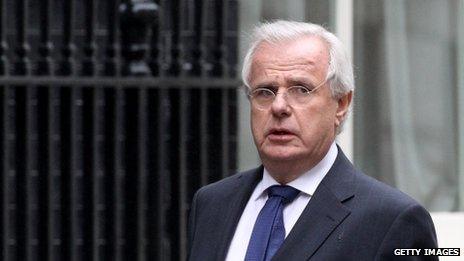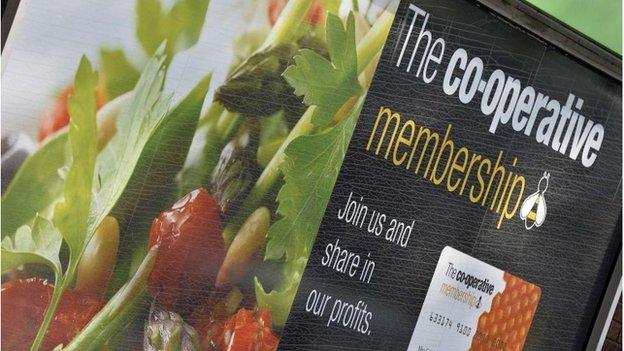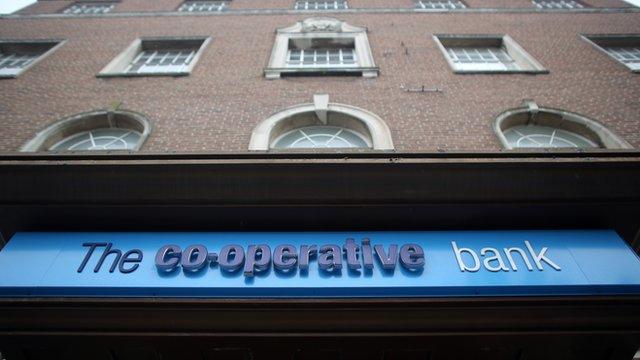Lord Myners to continue Co-op reform, despite board exit
- Published
Speaking in a Co-op group video in March, Lord Myners said the board "struggled to ask the right questions"
Former City minister Lord Myners has vowed to continue with his reforms of the Co-operative Group, despite quitting the troubled company's board amid growing opposition to his plans.
He said the mutual would have a "good future" if it did "the right things on governance and leadership".
News of his departure came a month after the resignation of the Group's chief executive, Euan Sutherland.
Lord Myners' plans have been criticised by some of the Group's biggest members.
The largest of the mutual's independent societies has already said it would vote against his reforms, aimed at simplifying the Co-op's governance and making it more like a publicly listed company.
'Value-destructive'
"I am confident that there is a good future for The Co-operative Group if it commits to doing the right things on governance and leadership," Lord Myners said in a statement on Thursday, the day after news of his plan to step down emerged.
The initial findings of his review into the company said its elected directors had overseen "breathtakingly value-destructive" decisions, like the Co-op's takeovers of Britannia building society and supermarket chain Somerfield.
He also found its three-tier system of elected member representation - made up of area committees, regional boards, and the group board - had "consistently produced governors without the necessary qualifications and experience to provide effective board leadership".
Too many directors, he said, did not have any serious business experience and were therefore not qualified to keep senior managers in check.
Reform plans
Part of Lord Myners' plans for change involve a board of directors appointed against clear criteria of skills and experience.
And he proposed a new, smaller board that would replace the current 20 elected directors with an independent chair, six or seven non-executive directors with business experience, and two executives from the group.
He said that without such changes the customer-owned group, dubbed "ungovernable" by Mr Sutherland, could face collapse.
Lord Myners will continue to sit on the board until his proposals are put to the company's annual general meeting on 17 May, at which he will not stand for re-election as a director.
"We are committed to reforming our governance and know that Lord Myners' report will provide invaluable stimulus for the changes we need to make," said Co-op Group chair, Ursula Lidbetter.
But some of the Co-op's most influential members are worried the changes could damage the group's values.
'Deeply concerned'
Its largest independent society, Midcounties, which along with about a dozen others accounts for 20% of board votes, has already said it will oppose Lord Myners' plans.
Patrick Gray, president of Midcounties, told the Today programme on Wednesday that any changes would only take place with negotiation.

Lord Myners was appointed as a senior independent director in December
"Most of the independent societies are deeply concerned, as we are," he added.
"We all support reform, but we want it to be done in a measured way. We don't want to be pushed into a corner and told either you accept this, or nothing.
"If he [Lord Myners] puts forward simply a menu on a take-it-or-leave-it basis, then we will vote against it."
Peter Hahn, of the Cass Business School, told the BBC that after "all these years of poor management, maybe Co-op Group is just not manageable in its current form".
But, he added, some of the regional Co-ops are very well run, "so maybe [the group] needs to be split into smaller more manageable units".
Bank troubles
Lord Myners was appointed as a senior independent director by Co-op Group chair Ursula Lidbetter in December, to undertake a full review of the entire business.
It followed the collapse last year of Co-op Bank's deal to take over 632 Lloyds Bank branches and the arrest of the bank's chairman, the Reverend Paul Flowers, on drug allegations.
Its banking arm alone is preparing to announce a loss of about £1.3bn for 2013.
Last November, it announced that a group of private investors, made up mostly of hedge funds, would inject nearly £1bn into the bank in exchange for a 70% ownership stake.
Last month it announced plans to raise another £400m by issuing new shares, after the discovery of additional costs related to past misconduct and poor documentation.
- Published17 April 2014

- Published9 April 2014
- Published12 March 2014
- Published12 December 2013
